Unique men and events. A lover of Ferrari of which he has been head for years winning more than anyone. A passionate, competent and in-white-gloves man. Other than drivers, in a Ferrari Montezemolo is better than anyone. He and Maranello, a love and successes story.
Luca was the Ferrari golden boy, as races responsible in the 1970s. And then, "master and commander" as president since 1992. What is certain are wins, achievements and some bitterness, collected over the years at the Red. The "special relationships" with the founder Enzo Ferrari and the Lawyer, Gianni Agnelli. The understanding with Niki Lauda, newfound glory with Michael Schumacher.
Luca Cordero di Montezemolo is perhaps even now the best possible president for Ferrari, although everything has changed. A clever, highborn, high class, charismatic, handsome man. And of great vision. With him in charge one of the two between Hamilton and Verstappen today would drive a Ferrari. As they are the best drivers and he at Ferrari hired the best drivers.
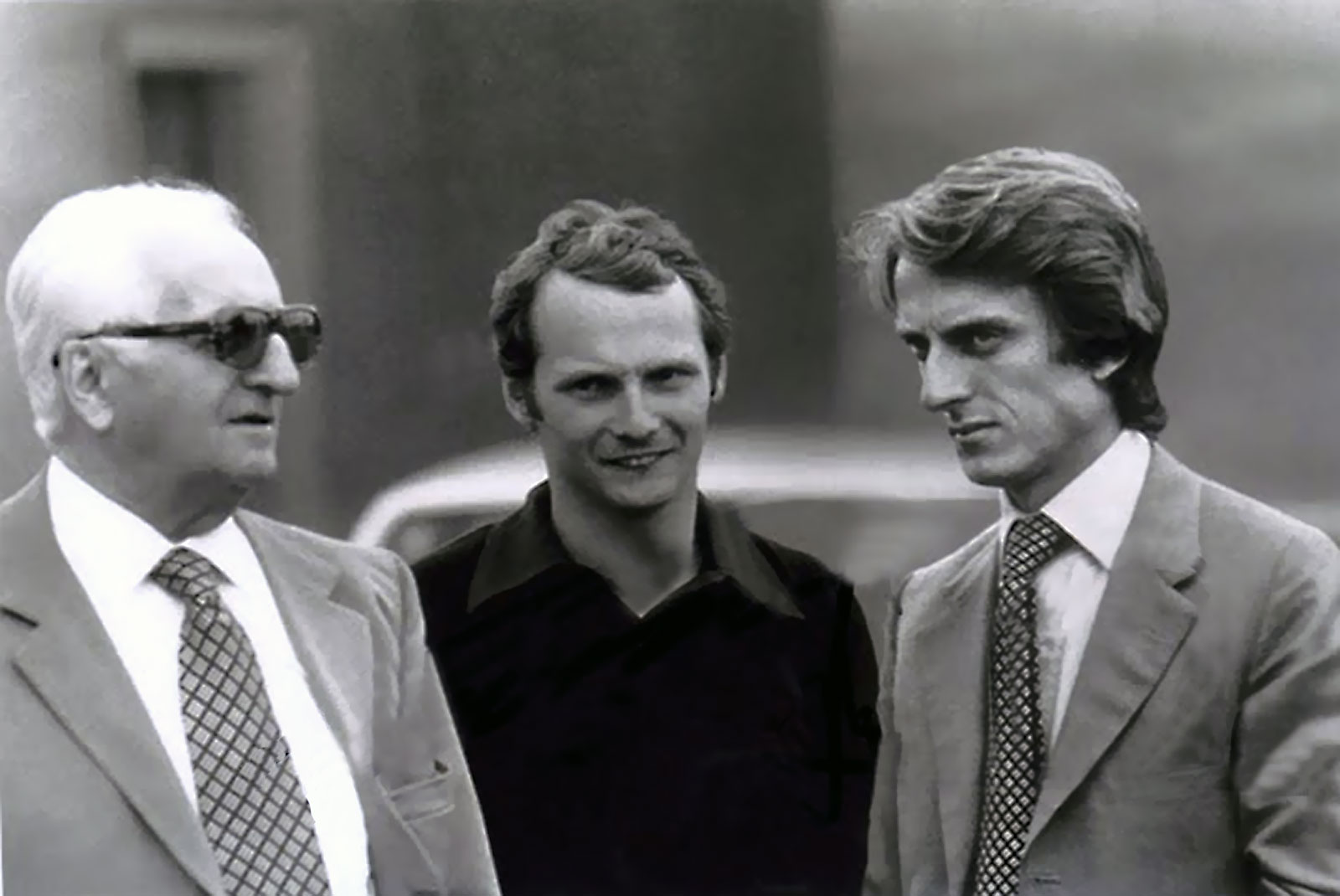
As Ferrari can’t and must not wait, it doesn’t train young people Ferrari, it has to win now. Luca was the last one to think that way, in his final years in fact there was Alonso and talk of Senna before his death. He had chosen every man who would have won with the Red for so many years, the dream team: Ross Brawn, Jean Todt, Rory Byrne and Michael Schumacher. He and Gianni Agnelli who authorized expenditures. The highest peak in the history of Ferrari and Formula One.
In the end his busy schedule and the attitude to be more a politician than a technician brought him to make mistakes and Marchionne, the heartless and without competence of car races financier, fired him in the roughest possible way, making him look ridiculous in the eyes of everyone.
Montezemolo symbolizes in every way the prototype of Ferrari president, an aristocrat, fan and talented. If we add Fenech the puzzle is complete. “He’s always three steps ahead. He’s the Steve Mc Queen of the automotive industry, he’s Mr. Cool, he’ll always be Mr. Cool” Rob, a friend of his, has said.
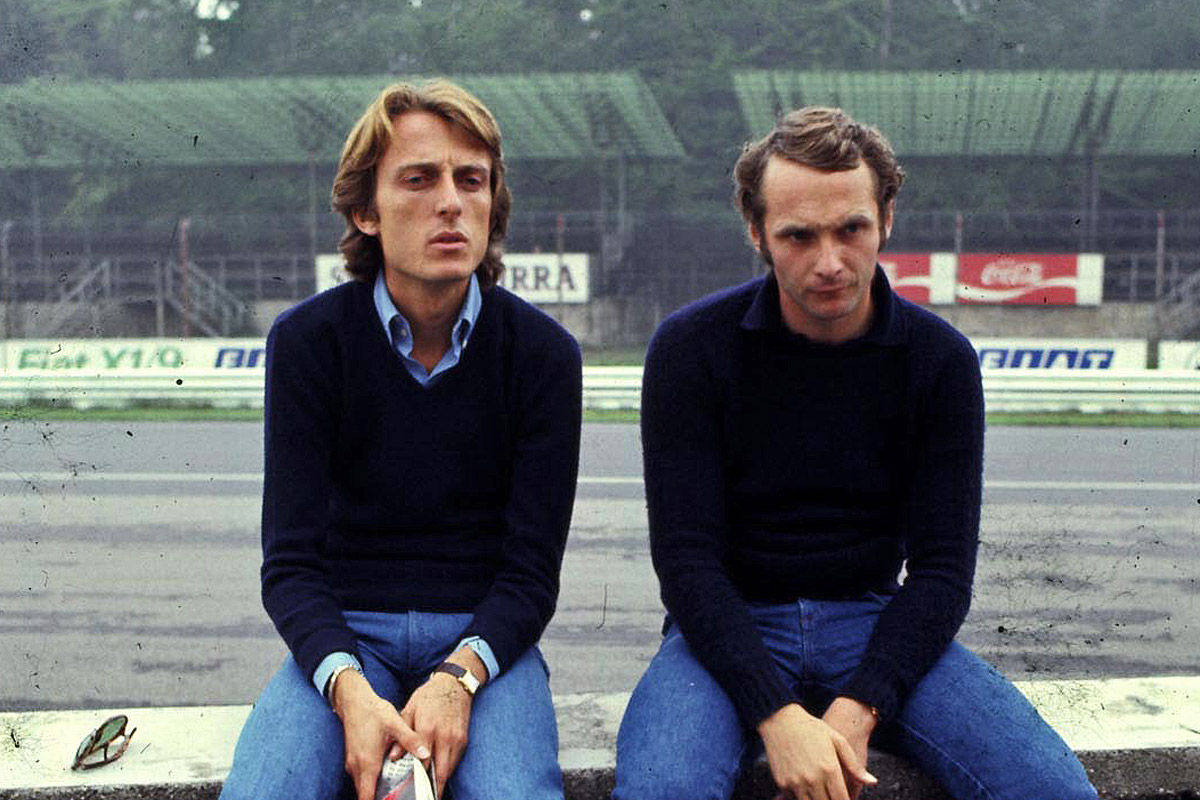
There’s no doubt, Luca di Montezemolo is the one who has created the “new Ferrari”, what it is now. Just verify how road cars of Prancing Horse were when he arrived in Maranello compared to what they are now, the wonders of 458 and 488 versus the much less glorious 348 (“in a 348 a Golf GTI overtook me,” Luca said).
Montezemolo became president in November 1991. The F1 season ended disastrously: Alesi 7° with just 21 points, Capelli dropped out of almost all the races. “If I think that last year we had Mansell and Prost...”, was one of the first comments of the president. The situation was not better about the road cars: production in excess of demand, cassa integrazione (redundancy), products with criticisms of the quality. So much to build rather than to rebuild and Montezemolo went many steps further and very few back, proving to be a global manager and a great marketing expert. He anticipated the European and Italian crisis, the Prancing Horse had to seek new territories in addition to America, already at the time the biggest market.
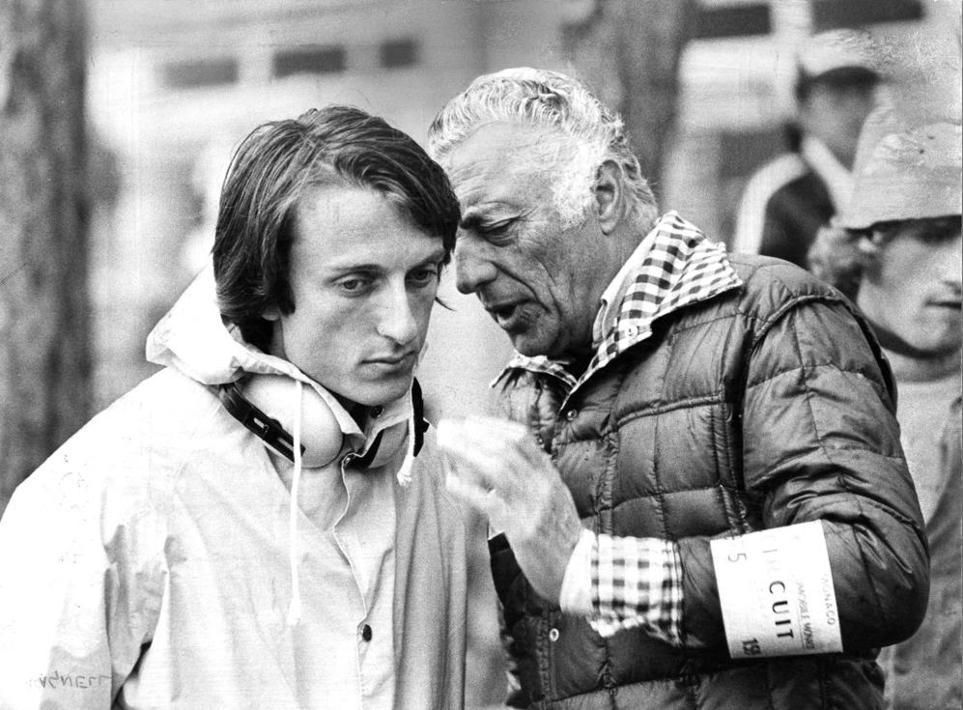
The F1 World Championship was missing to the Red from 1979. Montezemolo got to Maranello Jean Todt, then almost unknown. Together they decided to bid on Schumi and his faithful technicians, Ross Brawn and Rory Byrne, a team become invincible and deep in legend. A sporadic win of Berger in 1994, then those of Michael in 1996 and the title lost in the last race the following year. Two more years to wait, then 5 World championships in a row and an absolute dominion.
The old factory of Enzo Ferrari, in the meantime, was rebuilt brick by brick, leaving nothing to chance: efficiency, technology, environmental and employee respect. Until it became a world reference. Production grew little, the turnover, the image, earnings and the brand value instead increased. The range widened while remaining faithful to Drake’s overall structure of: “we don’t sell cars, but dreams.” The various models kept intact their super performances, but became increasingly usable, reliable, secure: cars to be used not only for exposure.
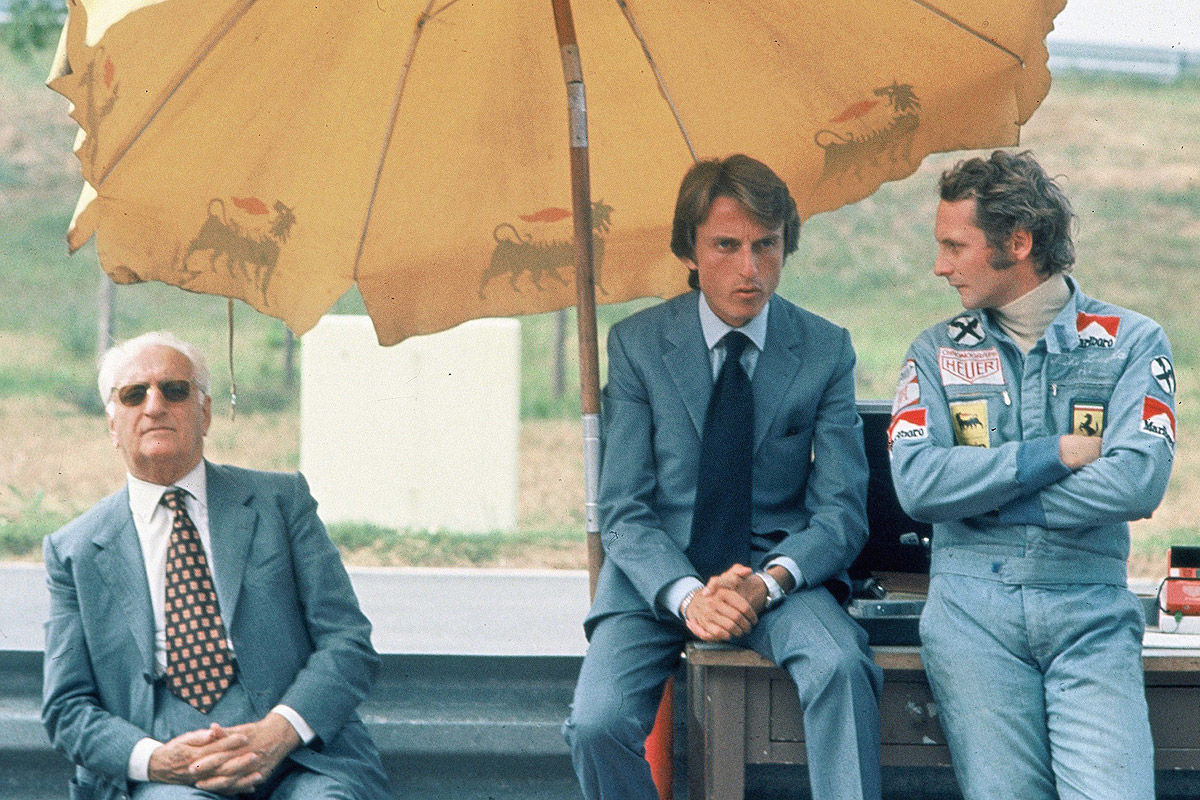
“Different Ferraris for different Ferraristi” was the formula used by the President at the presentations of the “comfortable” California and of the versatile FF (4 seats and also four-wheel drive). The clutch pedal disappeared (Ferrari was the first one to use the gearbox actuated with the paddles behind the steering wheel), carbon brakes arrived, merchandising took root. No Ferrari owner asked for a discount anymore, nearly all went to Maranello to define their car which will be unlike any other. Finally, the classic cars department to restore the jewels of the past: it’s no accident that nine out of ten of the most expensive cars ever sold at auction are just Ferraris.
Montezemolo had no doubts to identify in Montmelò 1996 the cornerstone of future triumphs: “in his first year (of Schumacher), in a rainy day in Barcellona I told myself: ‘now we are finally very close to start a very important era’. From 1997 to 2005 we were largely the best, against different teams and Michael was fantastic. What I liked about him was the ability to work with the team, he came in our Racing Squad like a child, full of enthusiasm. When we won we were all together, when we lost, we were equally all together. And this was very important.”
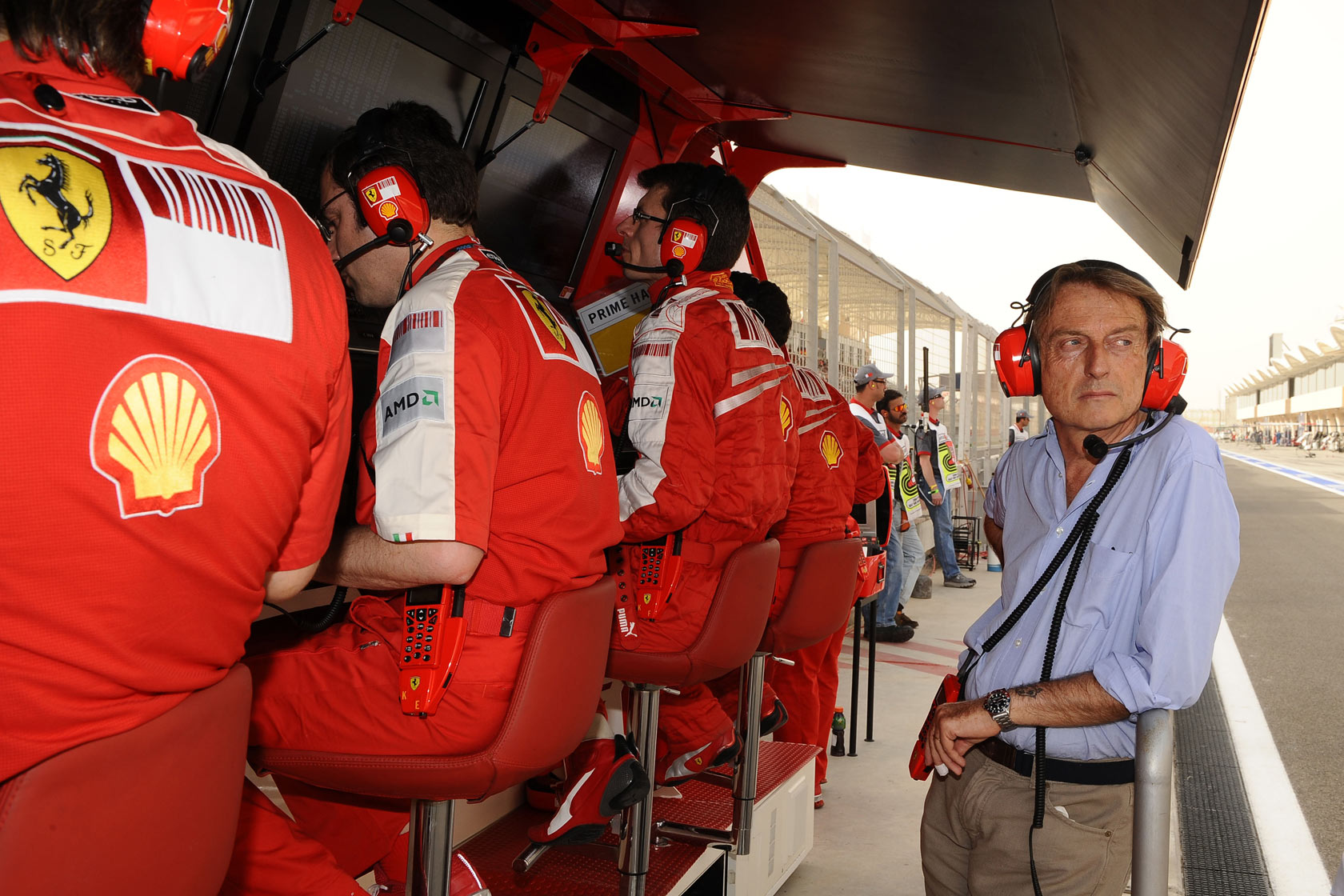
The Italian manager has then emphasised: “it’s a great thrill to see the cars, to recall amazing moments and it’s very sad not to have Michael physically here. He’s an important part of my life, we won lots of races. Only Niky has been as important as Michael in my professional life. With Michael it was different, as we started from the ground. Other than the talent, you can see his signature at Maranello even today.”
On the day of the 50th birthday of the German champion Montezemolo said: “we’ve chosen the right person at the right moment. I tried to put together a team with a little piece at a time, at first Jean Todt, then Ross Brawn and Rory Byrne to have a very strong organization and a competitive car. At that point we needed a driver who could make a difference. And so there was in 1996. I’m looking at the first and wonderful Michael’s win under the rain in Spain. That’s when I realized that we were in a position to come back to win after so much work. Michael, best wishes!”
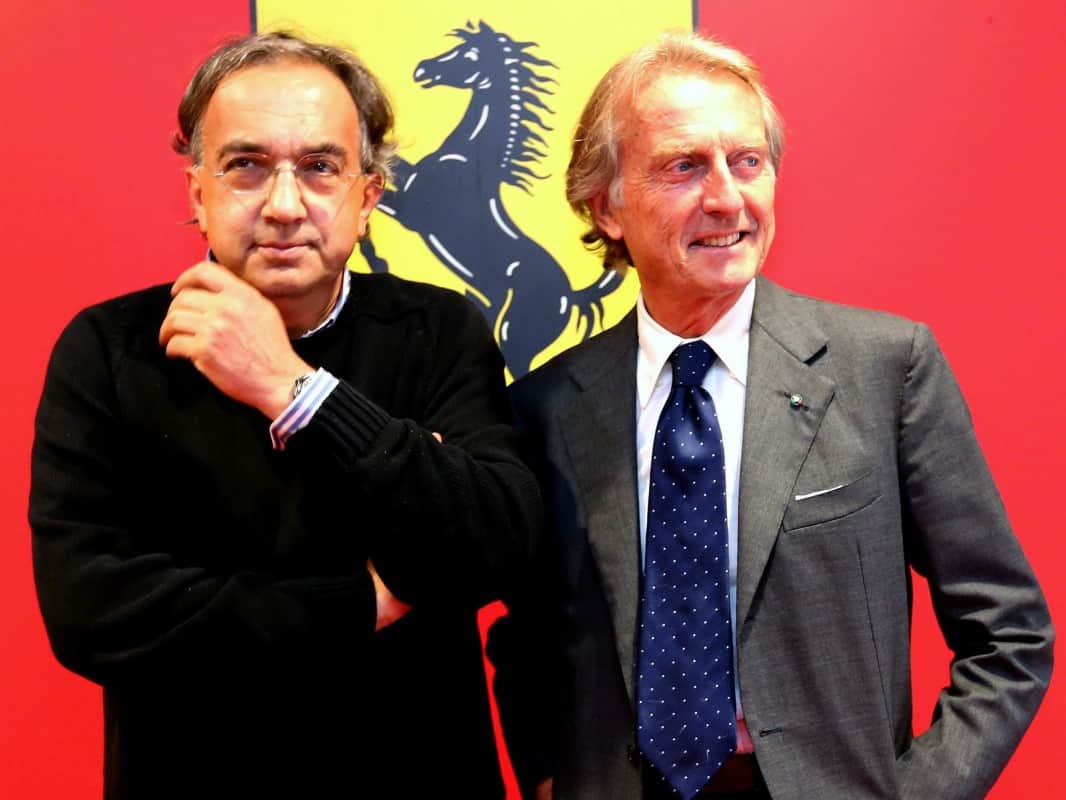
And again Luca about Michael: “I constantly receive news about Schumacher and, unfortunately, they are not good. He was a great driver, with him we have shared big human and professional moments. But life is weird. He was the most successful Formula One driver, he only had an accident in 1999 and it wasn’t his fault, it was ours. Unfortunately, an accidental fall on skis has ruined him,” Montezemolo said. “It’s not true that Michael was a reckless skier, off the track he has always been prudent. He was so especially while skiing,” he declared.
About Marchionne, instead, the former Ferrari president said to the newspaper Il Foglio: “Gianluigi Gabetti said: you two fight before you’re alike, and maybe he was right. Like in romances, you fight because you are too close or too different. Marchionne was one of the most capable managers in the world, in possession of uncommon courage and vision.”
In this way the manager from Bologna remembered the man who in September 2014 fired him without regard (“each one is necessary but no one is indispensable,” announced him in Cernobbio the Italian-Canadian). “It was the high point of an heated dispute on the fate of Ferrari,” cut short the former n°1 of Maranello, who, in a life braided more lives. “It was Umberto Agnelli in 2003 to talk to me for the first time about this Italian-Canadian manager, who had had positive results at the head of Sgs,” the Swiss colossus of quality certification, in orbit of Ifil, one of the two financial firms of Agnelli family.
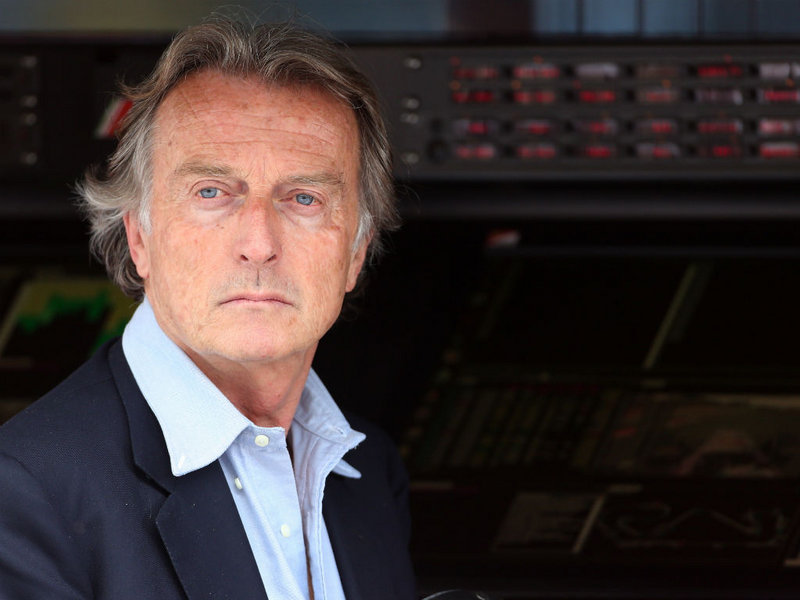
“Umberto informed me that Marchionne would have been on the board at Lingotto; it sounded great to me: the mix of Italian, Swiss and Canadian was in line with the profile of an Italian company open to international experiences. With Sergio we have shared a dramatic time for Fiat, in the hands of the banks and at risk of collapse. In 2004 the family asked me to assume the group’s presidency, I accepted and supported the choice to entrust Sergio with the operational management. From 2004 to 2007 we worked fundamentally agreeing on real strategic issues, from the agreement with General Motors to the crisis of Termini Imerese till the launch of Punto with much fanfare. He used to come visit me at home in Bologna, sometimes we kept time for breakfast at a restaurant at the gates of Turin. In a way, I accompanied him in a phase of orientation in the automotive sector detached from him. I was going through a complicated time as, to commitments at Fiat, I added the presidencies of Ferrari and Confindustria.”
Soon it seemed clear that the Marchionne revolution aimed to wipe out the last idols of family capitalism, the standard issue black sweater worn as an identifying feature in spite of ties and pinstriped suits of the establishment. “Marchionne,” Montezemolo concluded: “has contributed, at first hand, to save the group. He has acted as one man, after all who’s in charge is alone. Sergio has always been a single man in command.”
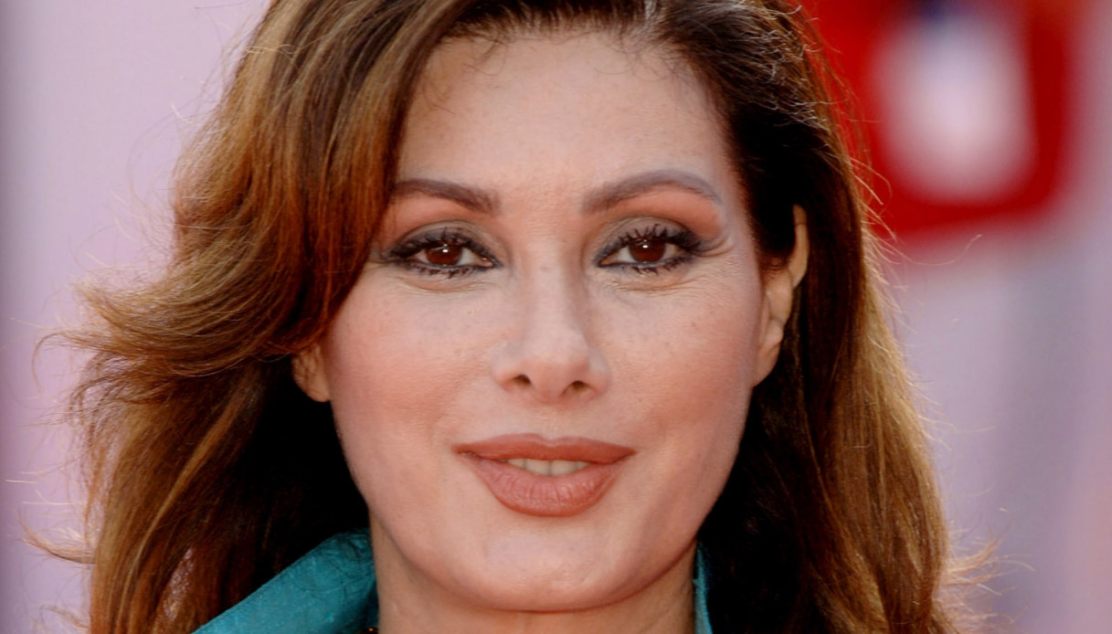
Said about Montezemolo Daniele Audetto, who started his motorsport career in rallying as a co-driver of Luca and Sandro Munari in the factory Lancia team, and in 1976 replaced the manager from Bologna as Ferrari team manager: “at Ferrari a figure like Montezemolo is missing. It’s true that Arrivabene made a good impression compared to the early days of Jean Todt, who has always been supported and defended by a great man of communication like Montezemolo. For years and years he shielded his men, including Schumacher who during the first four years didn’t win the title. Now there’s no Montezemolo to defend all and to handle the media.”
Luca Cordero di Montezemolo, the story of the billionaire who saved Ferrari. He, former Chairman of Ferrari, and formerly Chairman of Fiat S.p.A., is an icon. On Italian soil, he’s practically royalty. He comes from an aristocratic family from the region of Piedmont in Italy. He graduated with a degree in law from La Sapienza University in 1971. Afterward, he studied for a masters degree in international commercial law at Columbia University.
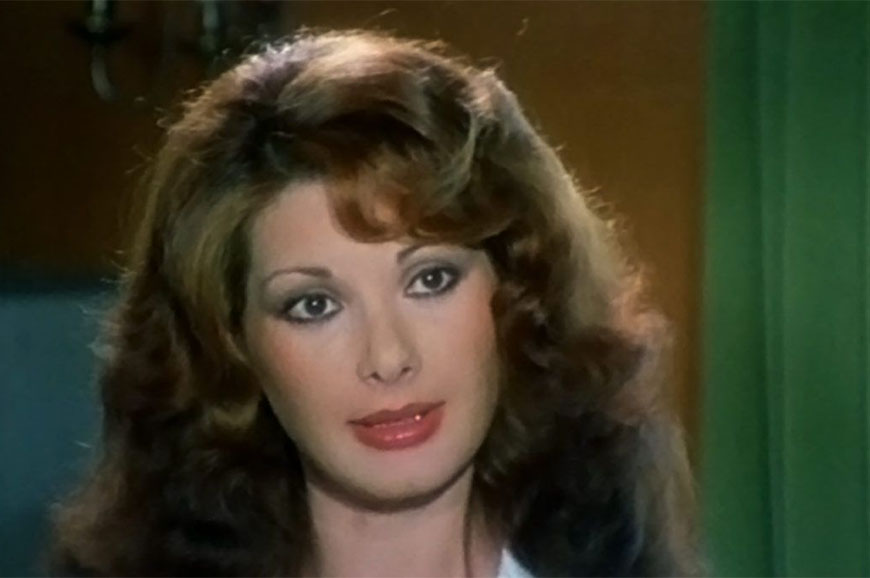
Born in Bologna, Italy, he is the youngest son of Massimo Cordero dei Marchesi di Montezemolo (1920–2009), a Piedmontese aristocrat whose family served the Royal House of Savoy for generations, and Clotilde Neri (b. 1922), niece of famed Italian surgeon Vincenzo Neri.
His long and unrivalled sporting career began at the wheel of a Giannini Fiat 500 which he raced together with his friend Cristiano Rattazzi. Later, he briefly drove for the privately owned Lancia rally team known as HF Squadra Corse. He joined the auto manufacturing conglomerate FIAT S.p.A., headquartered in Torino, Italy, and in 1973 was moved to Ferrari, where he became right hand man to Enzo Ferrari and, in 1974, manager of the Scuderia Ferrari’s F1 racing division. During his involvement with the team, Ferrari won the F1 World Championship with Niki Lauda in 1975 and 1977.
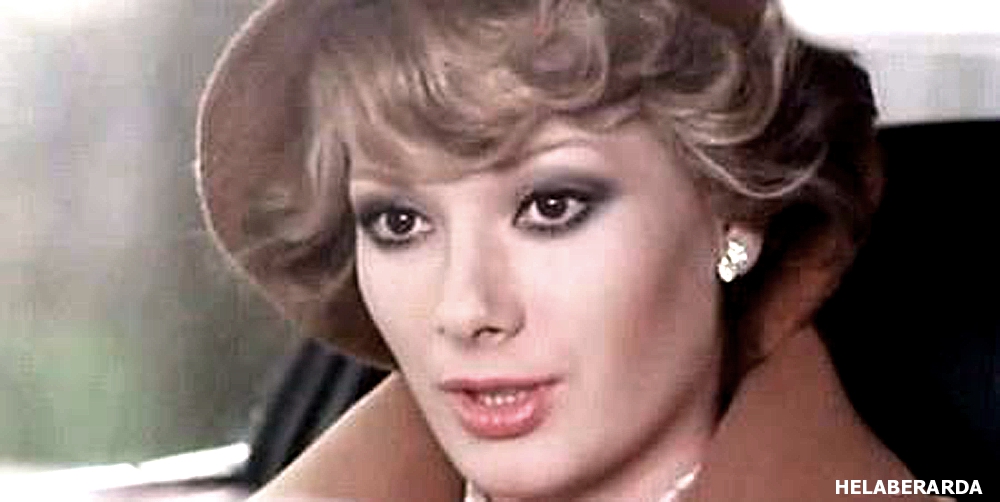
In 1976 Montezemolo was promoted to become head of all FIAT racing activities, and in 1977 he advanced to become a senior manager of FIAT, before going to on occupy a number of similarly important positions within the empire. But the call that cemented his career as it’s recognised today, came when Ferrari needed saving: in November 1991 Gianni Agnelli, Chairman and principal shareholder at Fiat, appointed Montezemolo president of Ferrari, which had been struggling since Enzo Ferrari's death.
Luca made it his personal goal to win the F1 World Constructors' Championship once again, making crucial changes to Italy’s racing team, including signing Niki Lauda as a consultant and promoting Claudio Lombardi to team manager. During the 1990s he resurrected the Ferrari road car business from heavy debts into solid profit. He also took on the presidency of Maserati when Ferrari acquired it in 1997, until 2005.
Under Montezemolo and executive director Jean Todt, the Ferrari F1 team won the World Drivers' Championship in 2000, the first time since 1979. The previous year, 1999, they had won the Constructors' Championship for the first time since 1983. On 27 May 2004, Montezemolo became president of Italian business lobby Confindustria. Days later, following the death of Umberto Agnelli on 28 May, he was elected chairman of Fiat S.p.A., Ferrari's parent company.
In April 2010, John Elkann replaced Montezemolo as Chairman of Fiat S.p.A. On 10 September 2014, Montezemolo resigned as president and chairman of Ferrari following increasing tension with his would-be successor, FIAT Chrysler CEO, Sergio Marchionne.
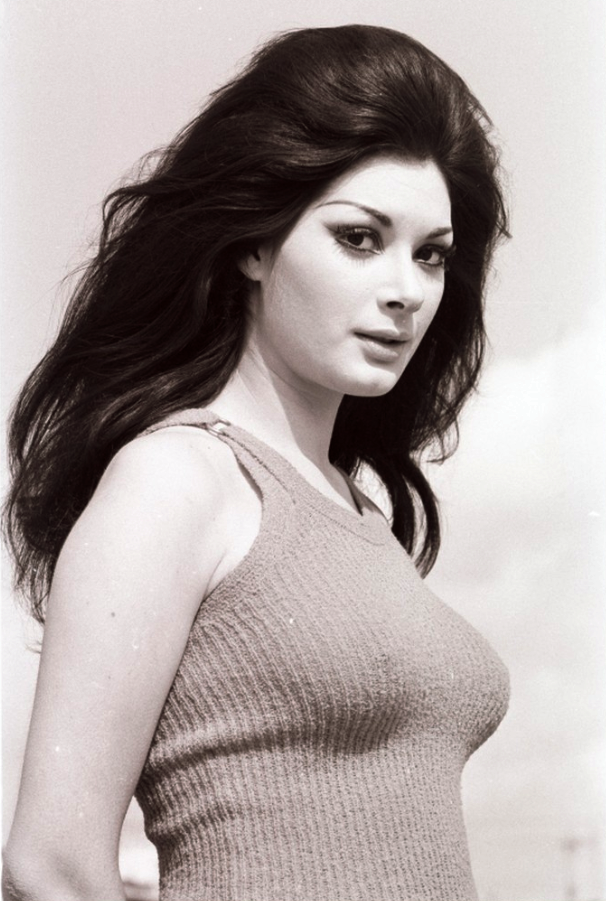
The Ferrari company, under Montezemolo’s 23 years leadership as Chairman and CEO, reached the highest levels of competitiveness in industrial design and manufacturing. As Sporting Director he also won 19 world drivers and constructors championships and 118 Grand Prix: he was a record breaker. His constant commitment to the car industry has won him countless awards and the respect of every single gentleman and woman in the industry: in 2015, he was given a hugely sight after spot in the the Automotive Hall of Fame of Detroit. Although there were financial struggles for Ferrari at the time of Enzo’s death and again during the 2008 recession, the company has still never had a money-losing quarter.
Leo Turrini, the popular Formula 1 journalist, interviewed Montezemolo in December 2018. “This may surprise you, but the first thing I can think, of Schumi, is not about the driver. But the family man… With him we won and rewon everything, many times. Our relationship had soon turned into personal friendship.”
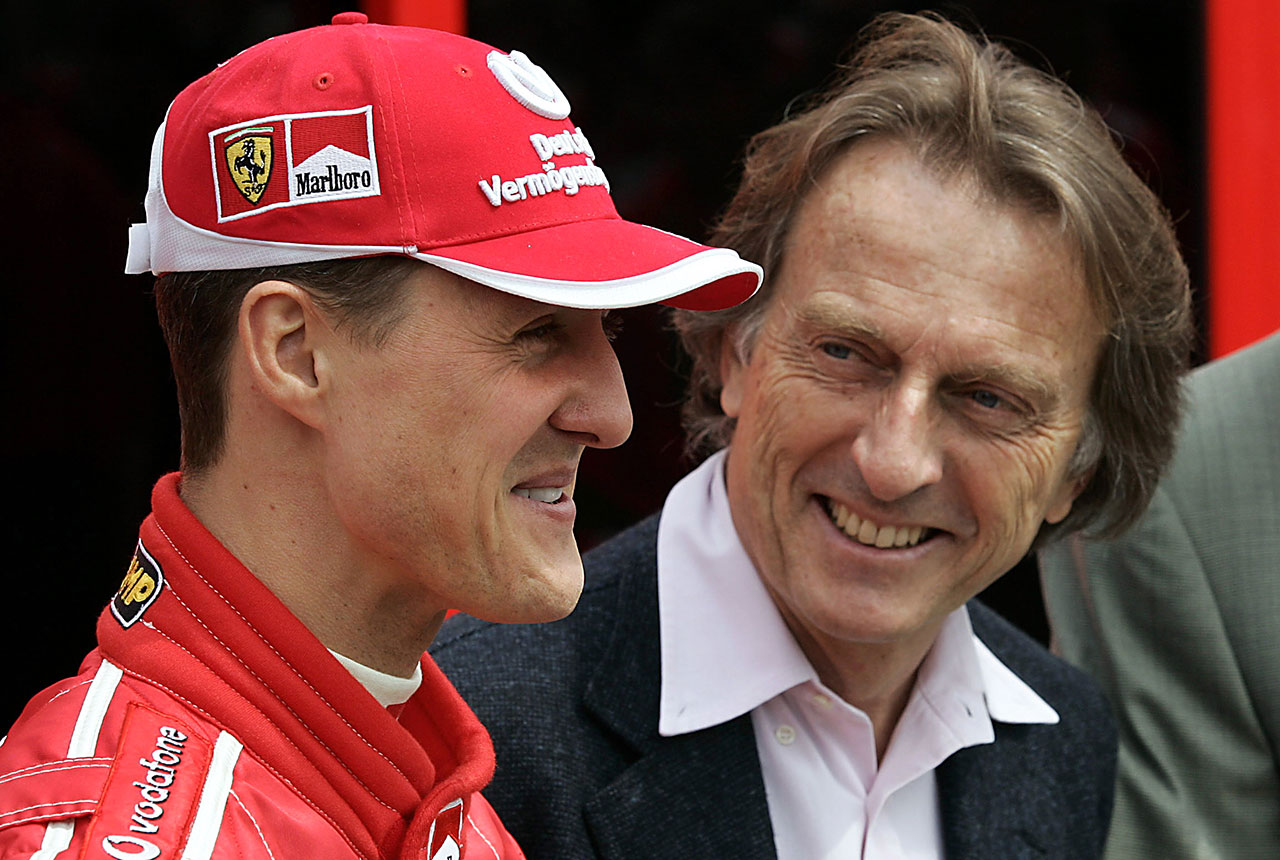
“Mick, the second son, was born recently. All the Schumacher came on vacation at my house. It was summer, mosquitoes time. Well, every five minutes Michael ran to see if by chance the child had been bitten by insects! His painstaking attention to detail struck me. With Schumi you realized that the smallest detail was however important.”
“You see, other than his immense talent at the wheel, I think he left a trace in the Ferrari DNA. He was always true to his conscience even in times of trouble.” That didn’t miss. “Of course not! Today rightly you remember victories, but he needed five years to succeed. In between there were losses and polemics (..). At least twice, in 1997 after the collision with Villeneuve and in 1998 after the incident with Coulthard, in Belgium, I have been pestered with invitations to fire him! To fire Schumacher, you know? I have been told he couldn’t control his emotions, imagine. What if I listened to presumed commentators…”.
The story would have been different. “But I trusted him and Todt, the team. Above all, I saw how Michael aided the growth of young engineers, who were learning from him, from his example.” He was a leader. "A team player at 100%. He drove my Ferrari from 1996 to 2006. You won’t find a polemic of him towards his factory.” The most Italian of the Germans. “With almost Southerner traits, as Schumi has always had a good dose of emotion, although he knew how to govern it.”
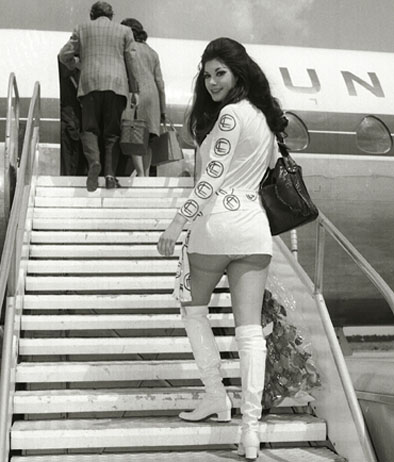 |
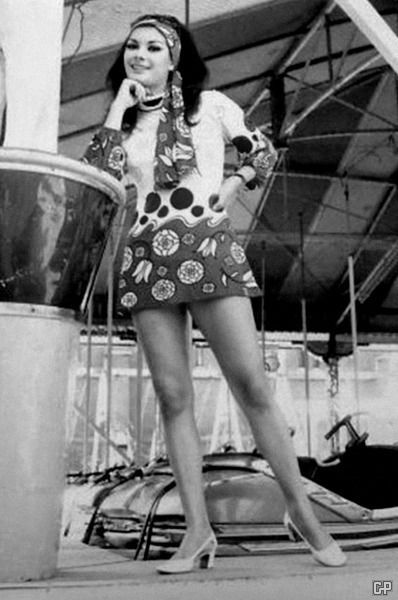 |
Is it true that he didn’t want to stay at a hotel? “He was often in Maranello for tests, which then were not limited. Since he used to play football with the mechanics and then to eat pizza, he didn’t love to show that he was back in the hotel at this late hour. So he asked me to be able to use the apartment that Enzo Ferrari had built next to the Fiorano circuit. (..) And the gym, because he was obsessed with physical fitness. So we fixed a garage for his training.”
You know, sometimes I feel like a Ferrari like this won’t come back. And not just for victories, I tell you for the atmosphere that you breathed. "It was a historic moment, there was a popular anxiety for that flaming world title which didn’t seem to want to arrive. Schumi embodied an almost messianic waiting.”
Until that Sunday, 8 October 2000, at Suzuka. “Ah, I was home in front of the television. I tormented amulets and talismans and prayed, mixing up profane and sacred. Three laps to go, I was holding my breath, the phone rings. It was Gianni Agnelli. Luca, he said, congratulations, the nightmare’s over. And me touching all, with the Avvocato who didn’t stop talking, luckily the chequered flag came!”
Agnelli loved Schumi. "He admired him. He said: this German is very dear to me, meaning he was very expensive, but it was worth it.”
How do you live Schumi’s present and the silence around him? “I support the choice of secrecy wanted by the family. I’m in contact with Corinna, I visited the museum of Kerpen, I hope for better news and wish Mick, the little boy scared by mosquitoes of my house, to repeat even if only partially his father’s accomplishments.”
And about 2019 Ferrari what do you say? “Nothing, for a clause of style. I’m a fan like a lot of people and like all I dream of rebirth…”.
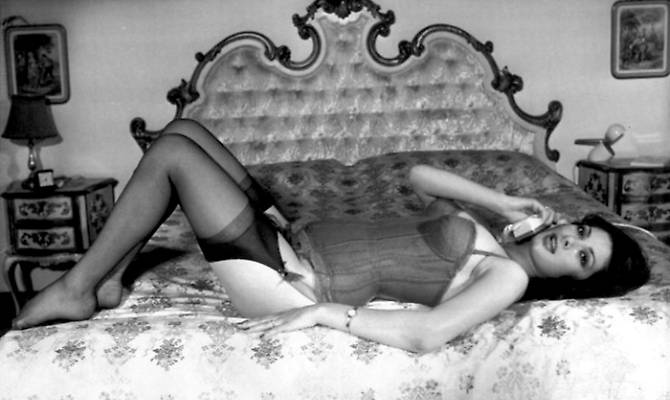
One of the great mysteries of the modern F1 era is just how Fernando Alonso struggled to truly leave his mark during his time with Ferrari, something which still causes the former president of the Italian team to woefully remember: “he’s the best driver I’ve ever seen on track. He impresses me for three things, for the interpretation of the race, especially for tires consumption, because he’s a great team motivator, and for his presence in Maranello.”
Luca Cordero di Montezemolo was in charge of the team during Alonso's spell with Scuderia Ferrari and has addressed any potential issues with the former Renault driver as Alonso enters what could be his final race in F1. The Spaniard will take a sabbatical for the 2019 season, although it remains unclear if he will ever return to the paddock, regardless he will be remembered as one of the sport's great champions.
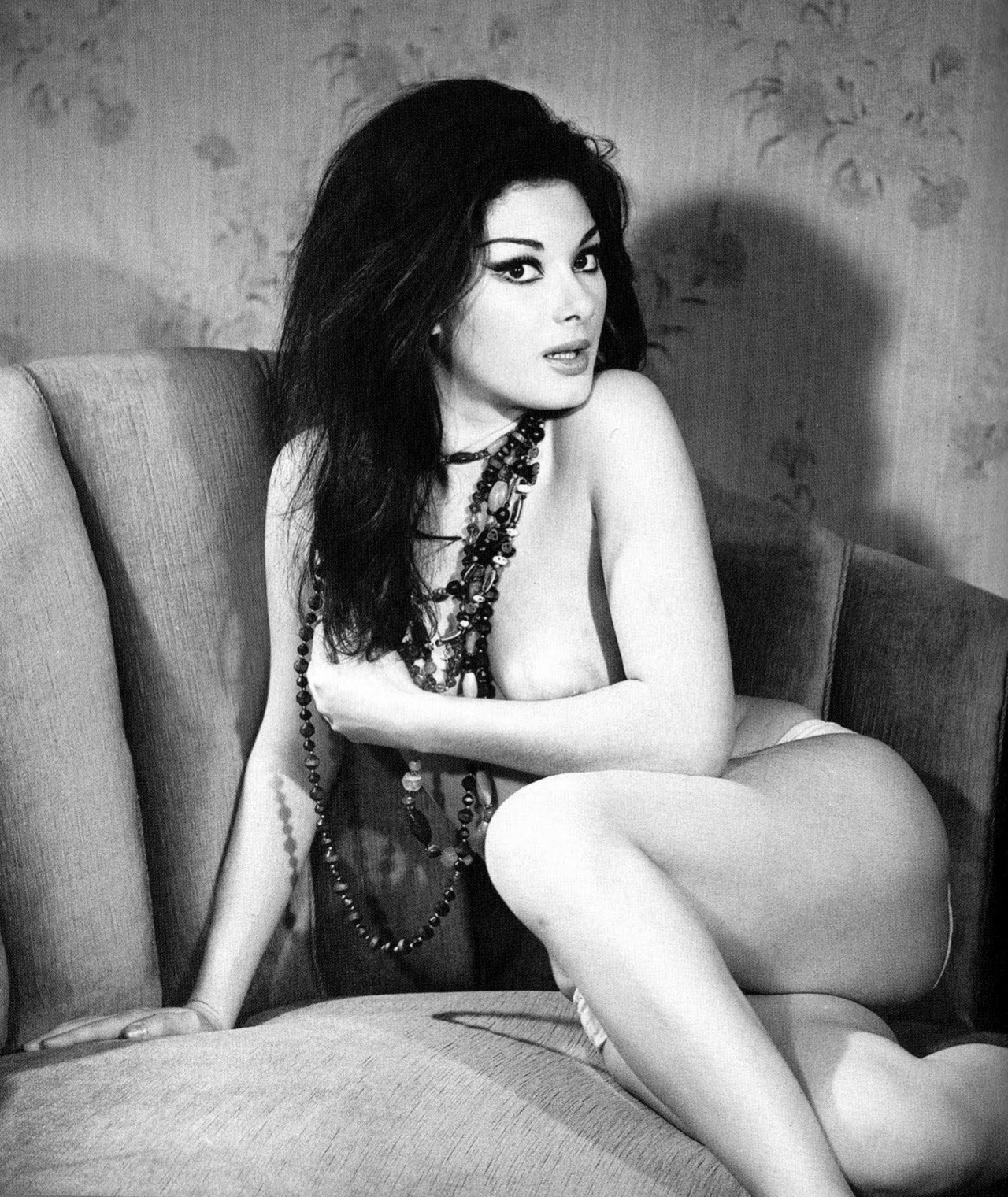
"I will always look back with sadness that the partnership between Ferrari and Alonso didn't work," he explained to the BBC. "He is still one of the best drivers on the grid now." During his five-year spell with Ferrari, Alonso was fighting for the World Championship every single season, even finishing as a runner-up on three occasions, but he simply couldn't repeat his feat from his Renault days and get over the line. "Despite not having the best car, the team did a fantastic job," he admitted. "This was a shame, because despite everything that happened in 2010 and 2012, we could have won the championship."
The immediate future of Alonso's career has already been determined with the driver likely to pursue alternative motorsport commitments throughout 2019. However, Di Montezemolo believes that an internal crisis within the driver is what has prevented him from adding to his two championship triumphs. "Fernando has always been a very stable guy but he went into a crisis with himself from 2013," he confirmed. "He began to doubt himself." Michael [Schumacher] was closer to the team in difficult moments whilst Fernando was a little more self-reflecting, they had different ways of thinking but both were sensational drivers."
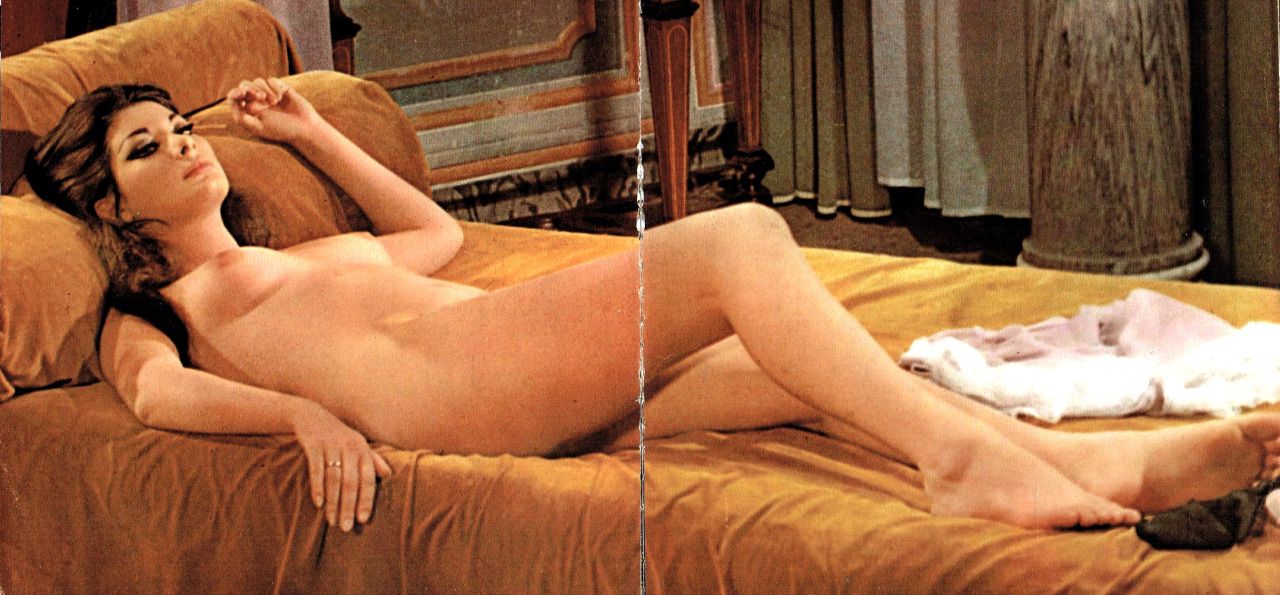
"We beat a team who had better performance." Lewis Hamilton reflects on the 2018 season after clinching his fifth Formula 1 world title on 28th October. If in his dreams, maybe when he was still at the top of Maranello, Luca di Montezemolo was keen to bring five-times world champion Hamilton in Emilia Romagna, ripping him out of Mercedes after his abandonment of McLaren, we’ll never know.
The arrival of Vettel, then surely not the best driver of the circus, was, instead, the final shot of Domenicali management (supported in the choice by the same former president), both of them went out through the via Abetone door in parallel at the beginning of 2014. On the 2018 F1 championship however Luca said: “with Lewis Hamilton at the wheel, Ferrari would have won the 2018 world championship. This year Hamilton made the difference in his best season since his debut. He has had moments of weakness and crisis, but this year with Ferrari he would have won. I say that not to belittle Vettel, who has every opportunity to rebuild with a competitive car," the Italian added. And nobody, I believe, can blame him.
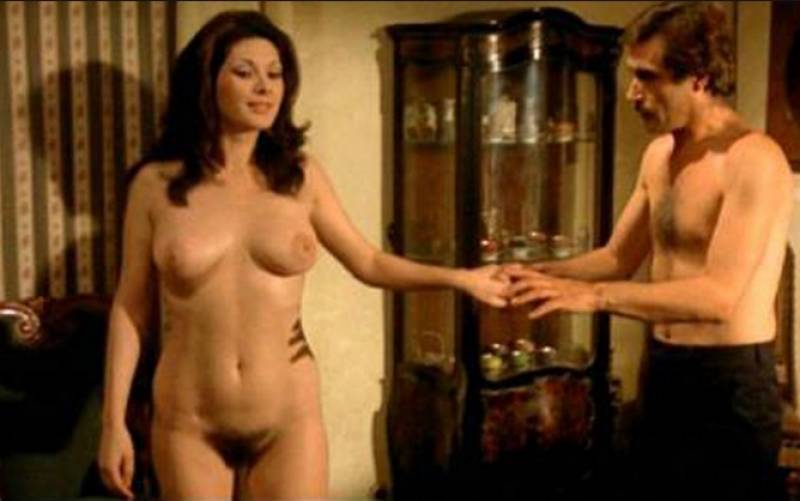
Luca Cordero dei marchesi di Montezemolo has chosen Il Giornale to tell love and passion, achievements and failures, friends and enemies of a personal history always at the front row during 40 years of life of the country. “The memory of field trips on a Vespa, with parents, when “we were good with little”, that “was an Italy poor, but rich in dignity”, the Italy of “vestito della domenica (Sunday best), the jacket not to get ruined”.
The Financial Times inserted him for two years among the 50 world’s greatest managers but some people say that he has never worked. He smiles. Then he doesn’t smile anymore. “You know that this whole working little really pisses me off? You know that for the first time in four decades, this month, I will be able to take twenty days off all together? Just ask them, call them, tomorrow all those who have worked with me in 40 years. Ask them about Saturday afternoons when they told me please avvocato, not on Sunday, let’s postpone this meeting to Monday, because we have families, we…? You know that as president and C.E.O. of Ferrari I found myself at the same time president of Confindustria and of a Fiat in difficulty and in the hands of the banks and with Agnelli family together after Umberto died to ask me to help it and to take up that post? And me who would have liked anything but say yes?”
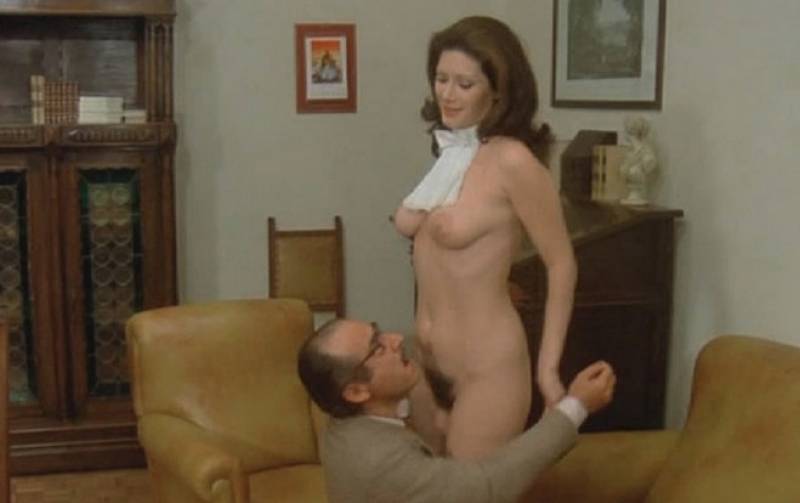
And instead you said yes, for gratitude towards Agnelli family. In respect in particular of the Avvocato, of whom there have often been reports: “yes, yes, the same thing, that I would be his son. But please… But my poor mother… But my poor dad…” Montezemolo says. Gianni Agnelli, he explains, "was a second father very accomplice, a person from whom I have learned so much and to whom I owe a lot. A great friend with whom, beyond the age difference, I had a lot in common.” Another stone in his shoe is for the one who says that he’s just lucky.
“Excuse me: Ferrari team manager in 1975 when it hadn’t won for a decade, is this just luck or there was to change and someone believed I could have done it? And I’m sorry, Fiat external relations in the middle of terrorism? And Azzurra and Italia ’90 presidency called by Havelange, Fifa number one? And the coming back to a losing Ferrari, in 1991, in redundancy, with old models and on the eve of the car crisis? And Fiat presidency in their darkest times? Is it just luck? Or maybe they believed in me who stood up for it? Just luck or it’s also a bit of courage, curiosity, vision, passion? And Confindustria? Even now many friends businessmen remember with pleasure of my Confindustria... Yes, yes, a lucky man who does nothing. Like with Italo. A success fruit of an idea, of a risk, of a big business venture started from a blank piece of paper and into a thousand difficulties. Eleven million and a half passengers in the last year. But… just luck.”
Another small stone is for the envious. Like when he was engaged to Edwige Fenech. “The great Ferrari was asking me about girlfriends, then one day he started to ask about Edwige. I was no longer at Ferrari for some time. I worked at Cinzano. He wanted to know her and finally when I introduced her to him, he got very excited. Once Edwige had left, he pulled me aside and told me: you know that she’s way cooler than you. No wonder, I answered him, she’s a hell of a… No, no, he interrupted me, I don’t say that because she’s beautiful, but because she’s smarter than you. Yes. A wonderful person Edwige. We met when I was 38-39, we were together seventeen years [...] How many rumors about us, how many jealousies, envy. When she conducted “Domenica in” she went into everyone’s home. I remember malicious: ah, she’s there because she is Montezemolo’s girlfriend. And meanwhile they tried to discredit me as it had to be necessarily not serious a manager who was with an actress. Berlusconi offered me to be a minister talking at “Porta a porta”. I called Gianni Letta who explained to me: you know, he likes you, he respects you. I was in great difficulty. So I called up the lawyer Agnelli. And he also said: you have to do it Luca. For the country. I don’t feel like it, I told him. Two mornings after, at Ferrari, I got on the table a 10-page document: it was all signatures of workers who were asking me to stay. I called Silvio and I told him: thanks, but faced with this I really can’t leave.”
Quotes by Luca Cordero di Montezemolo
- Of Senna I remember kindness and his simplicity that almost seemed shyness, in sharp contrast to the driver Senna, a fighter always determined to get the maximum. I had always appreciated the way of racing of Ayrton. As in all great champions even in him there was always an enormous desire to win, he was never too tired to search for perfection and he constantly tried to do better, he was extraordinary in qualifying but also a big combatant in the race, always having a knife in his teeth. He would have ended his career at Ferrari.
- Miracles? When you do, you usually perform only one. (Luca Cordero di Montezemolo recalling the resounding victory of Kimi Räikkönen in the last race)
- In life it is difficult to win, but it is more difficult to accept when you don't win.
- Let's make it clear: it's Ferrari I'm interested in. Drivers, we've had a lot, some very good, some great, but drivers come and go, while Ferrari remains.
- With a brand - and I respect Porsche - but the Ferrari brand is more exclusive... We never do SUVs, we never do four doors, and we never exceed 7,000 cars per year. And 7,000 means 7,000.
- I don't like nouvelle cuisine, too small bits. I like to have a nice wine, nice pasta, tomatoes.
- We do not invest in advertising... So racing is the best advertising for Ferrari.
- I always say to my people, 'If you don't sell a Ferrari to a football player, you make a big present to me.' Really. Because they buy to just show off. I don't like.
- I like the world, but I feel very, very Italian. I love the small parts of my country: Tuscany, Capri in the winter. I don't like big towns.
- Formula 1 has to be more and more also a laboratory, a centre of advanced research for innovative technologies for tomorrow's cars. The KERS is very important in this context, and Ferrari as a manufacturer had, and has, extraordinary support in Formula 1.
- I'm a full-of-contradictions kind of guy.
- Formula 1 will always have high and strong investment. Who can't make these investments will race in other series.
- I don't believe in the electric cars, but I strongly believe in hybrids.
- I want to have different Ferraris for different Ferraristi. We have a lot of parallel activities that can increase revenues without being obliged to produce more cars.
- We don't sell a car, we sell a dream. We are Italy's national team. There are many great soccer teams in our country, but there is only one Ferrari.
- I'm married to Ferrari.
- Ferrari used to be the car that you kept in your garage, took out to polish and show, and put back into the garage.
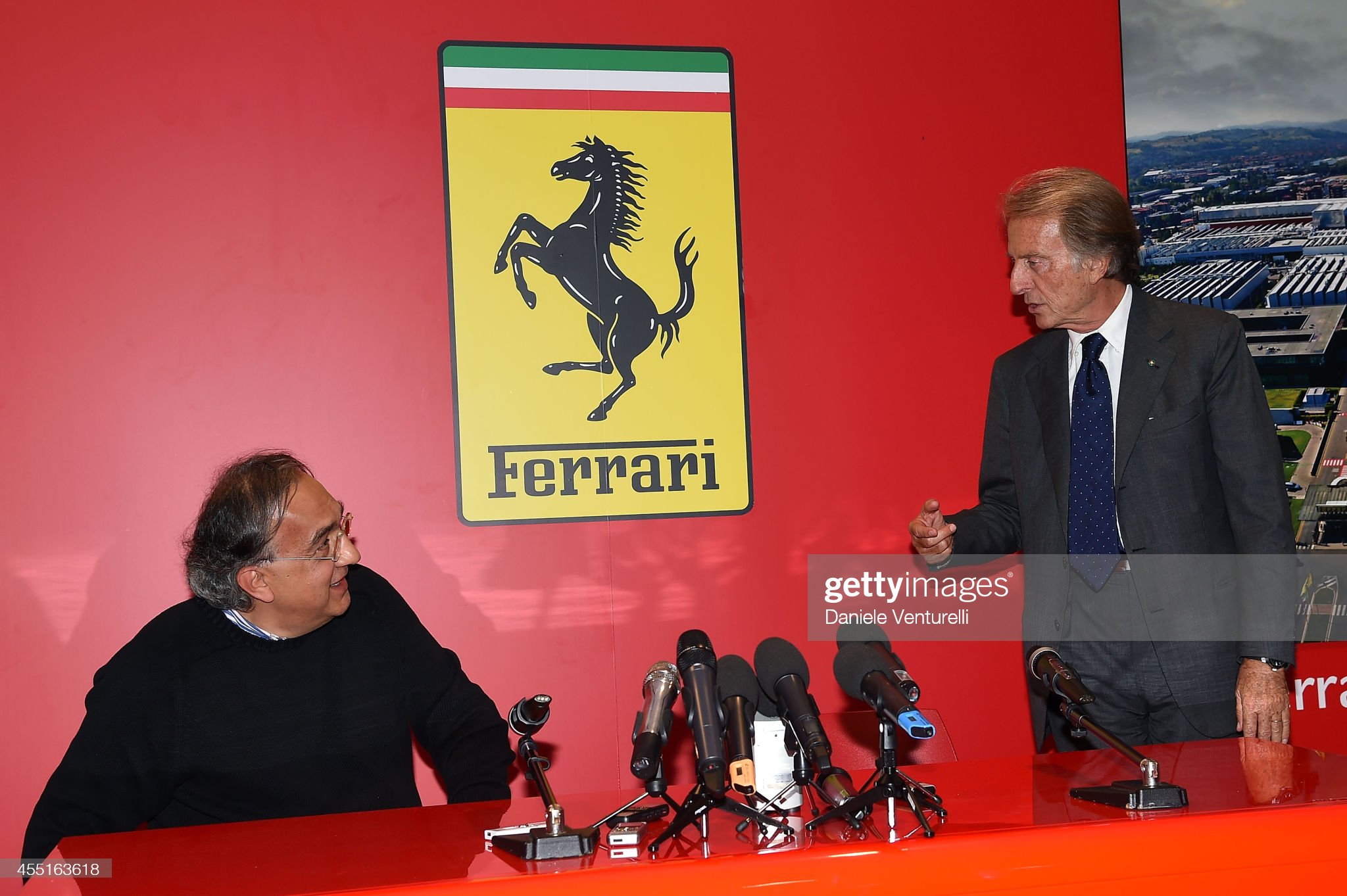
CEO of FIAT and CEO of Chrysler Sergio Marchionne and Luca Cordero di Montezemolo attend the Ferrari Press Conference on September 10, 2014 in Maranello, Italy. Luca Cordero di Montezemolo announces he is quitting his position as President of Ferrari in October after 23 years. Photo by Venturelli/Getty Images.
On June 26, 2018, four years ago, in Rome, it was his last public outing, for me the true anniversary of his death, which took place on July 25, 2018. That day the CEO of Fiat Chrysler Automobiles had to deliver to the Commander General of the Arma of the Carabinieri a Jeep Wrangler, a moment of serenity; on the contrary, I still have the clear vision of his suffering walking, surrounded by a multitude of men dressed in black who looked like a firing squad while accompanying the condemned man. There was a lectern, placed under the pines of the Pincio, which turned into an improvised confessional whose grate was not visible even if we began to speak softly, as if the trees had ears. The two of us alone, he had sent away his collaborators present at the event, behind him; to support him Davide Barca who, for years, protected not only his physical integrity but also his privacy, with a filial affection. Marchionne could not bear to show his weakness, even if it was there for all to see; his tired voice asked me to help him hide his physical frailty and, at the same time, entrusted his most tormented thoughts to me, as if he wanted to free himself. "When I liquidated Montezemolo from Ferrari, we were in Cernobbio, know that I was ashamed as a thief, but I was forced to do so, he didn't deserve to be kicked out like that." This Sergio Marchionne declared and I can affirm that he was deeply sincere. Bianca Carretto for www.corriere.it
Videos
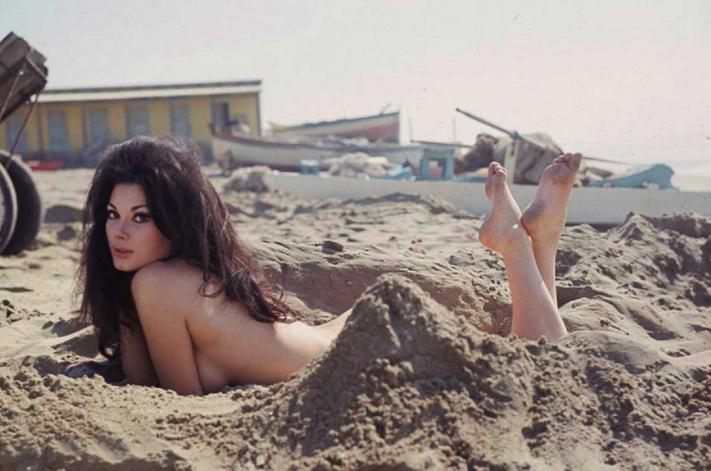
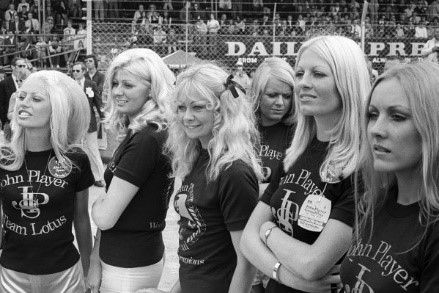
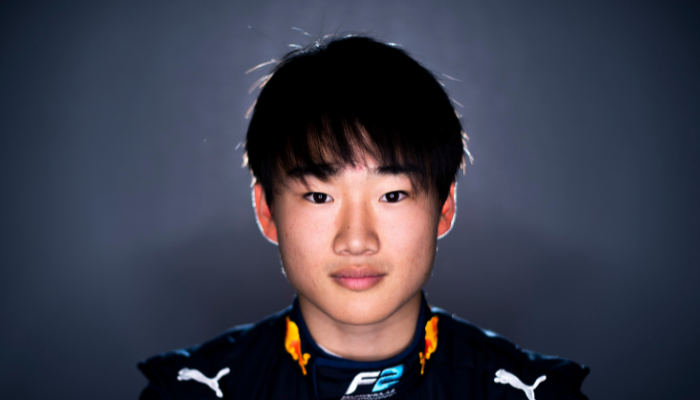
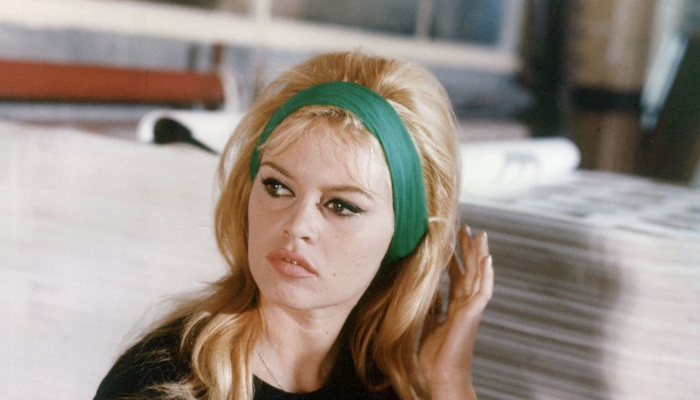
Comments
Authorize to comment